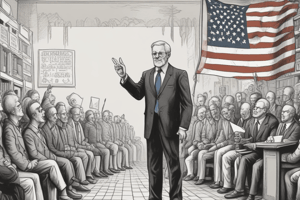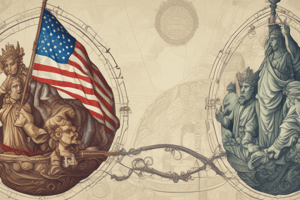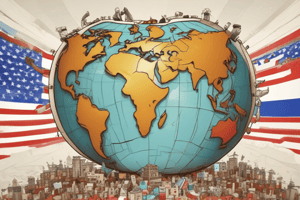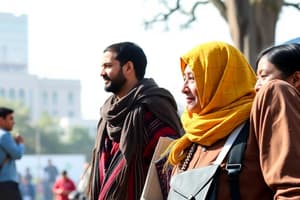Podcast
Questions and Answers
What distinguishes Applied Politics from Theoretical Politics?
What distinguishes Applied Politics from Theoretical Politics?
- Applied Politics encompasses the theory of governance.
- Applied Politics is focused solely on historical analysis.
- Theoretical Politics is concerned with the theory of state and government. (correct)
- Theoretical Politics relates to the practice of state and government.
Which of the following best defines political power?
Which of the following best defines political power?
- The privilege of ruling without any accountability.
- The capacity to completely eliminate any opposition.
- The ability to suppress dissent among citizens.
- The authority to control people's behavior and influence events. (correct)
How is justice commonly defined in political contexts?
How is justice commonly defined in political contexts?
- Providing each person with what they deserve. (correct)
- Focusing on legal punishment to deter crime.
- Balancing the needs of the majority with those of the minority.
- Ensuring equal rights for all individuals.
In the context of political theory, what does the term 'political order' refer to?
In the context of political theory, what does the term 'political order' refer to?
What view do modern political scientists hold regarding Politics and Political Science?
What view do modern political scientists hold regarding Politics and Political Science?
What aspect is central to a monarchy as described in the political context?
What aspect is central to a monarchy as described in the political context?
Study Notes
Understanding Politics
- Politics organizes and interprets social affairs to gain greater control over situations.
- Distinction drawn by Pollock between Theoretical Politics (Political Science) as the study of state and government and Applied Politics as their practice.
Perspectives on Political Science
- Modern Political Scientists reject the separation of Politics and Political Science.
- Politics is viewed as encompassing the study of the state, government, political relations, and processes.
Political Power and Justice
- Political power refers to the capacity to control individual behavior or influence event outcomes.
- Justice entails giving individuals what they deserve, aligning with the concept of each person receiving their due.
Monarchy and Political Order
- Political order can be characterized by a monarchy where leadership is legitimized through noble lineage and honor.
- Authority in a monarchy is granted to a single ruler (king) who exercises control over society.
Studying That Suits You
Use AI to generate personalized quizzes and flashcards to suit your learning preferences.
Description
This quiz explores the differences between Theoretical Politics and Applied Politics, as discussed by scholars such as Pollock. It delves into the perspectives on how modern political scientists view the relationship between politics and political science, emphasizing the interplay between theory and practice in governance.




